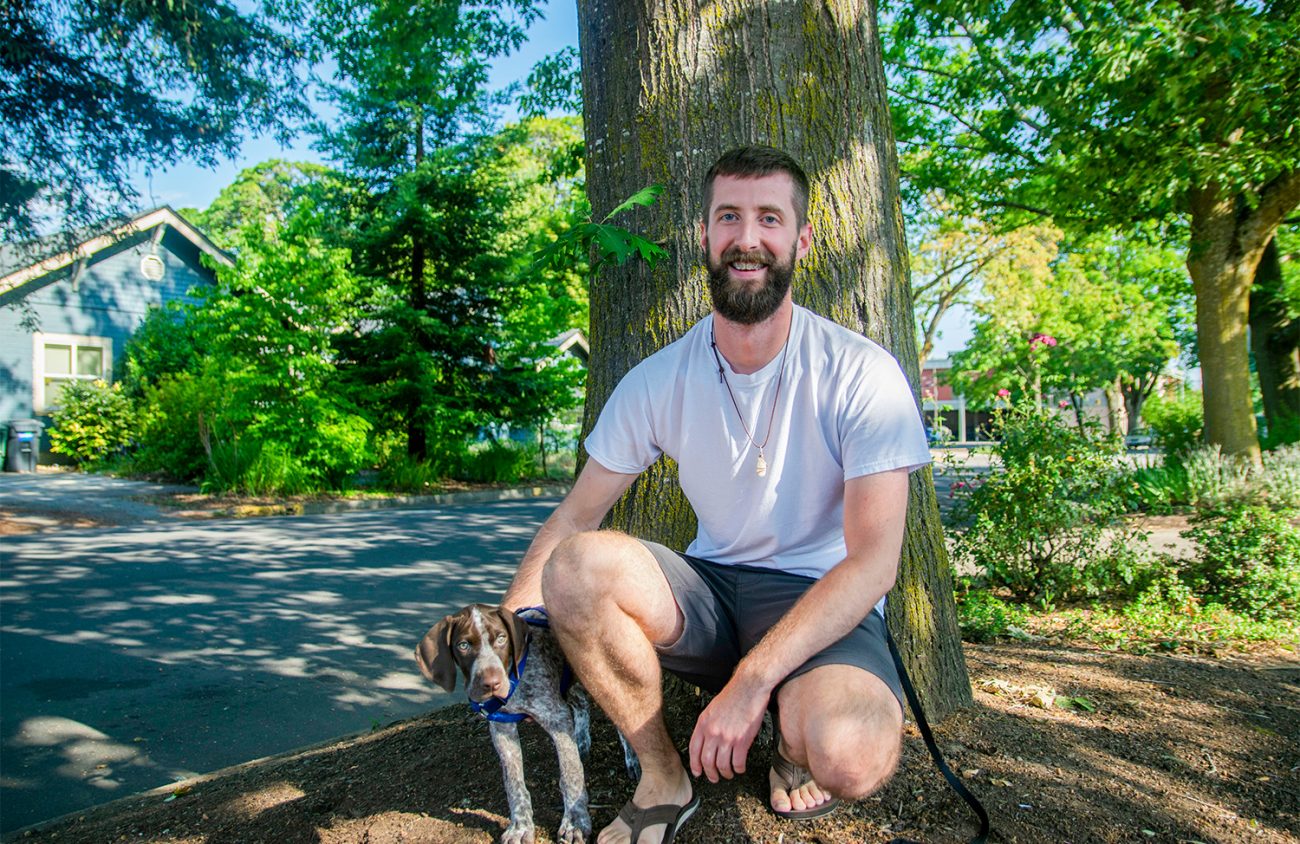Although Eugene’s controversial downtown “dog ban” lapsed late last year, another recent restriction aims to limit dogs downtown by banning those without rabies vaccinations. Unfortunately for local dog lovers, the new ban includes all puppies.
Back on May 29, the Eugene City Council passed an ordinance restricting “unlicensed dogs” from the downtown sector, stating that pets in that area must have a valid license on their collar or harness certifying that they have been vaccinated for rabies. Since puppies are not vaccinated for rabies before they are a couple months old, this effectively means that the City Council has banned puppies from the downtown core.
Scott Haynes lives in downtown Eugene with his German shorthair pointer puppy Duncan.
Duncan is 10 weeks old, not quite old enough to receive the rabies vaccination.
“Fourteen weeks is when the vets will do it,” Haynes says of the rabies vaccination, “because it’s one of the last one [dogs] get.”
Though the age can vary within a few weeks, Michelle Pedigo, practice manager at Q Street Animal Hospital in Springfield, says 16 weeks is usually the go-to age.
“Usually 16 weeks is the best time,” Pedigo says. “Usually around the time when they’re already going to get spayed or neutered.”
The city isn’t budging on this ordinance, though. Laura Hammond, community relations director for the city, says the rule applies to all dogs.
“Since puppies cannot be vaccinated until a certain age, owners should try to avoid taking their puppies into the designated area,” Hammond says. “If they are contacted by an officer about their dog, they will be given information about the licensing requirement before further action is taken.”
Haynes, an incoming graduate student working on getting his masters degree in social work, says he first heard about the new dog ordinance from a friend but has not been confronted by any police officers about his puppy; in fact, he’s had quite the opposite experience.
“It was kind of funny,” Haynes says. “There were two police officers in the middle of arresting somebody and they stopped and one of them was like, ‘Look at this puppy,’ and got the other one’s attention.”
Haynes says the officers stopped what they were doing to casually ask him how old Duncan was while the person they were arresting was in handcuffs sitting on the curb.
“And then there were two police who came to my building to do a wellness check on somebody,” Haynes says, “and they saw him and didn’t say anything.”
Haynes says he’s talked to travelers and other people experiencing homelessness downtown who haven’t had such pleasant interactions with the authorities.
“I’ve talked to some other people downtown, some travelers, who saw my puppy and told me that one of their friends got a citation or a ticket or something for having a puppy,” Haynes says.
He says he supports dogs having to get rabies vaccines, but the fact that the ordinance is only in the downtown area — and not the whole city — shows some bias towards targeting the homeless population.
The city, and Lane County, each require dogs over 6 months or with permanent canine teeth to have rabies vaccinations and be licensed.
“It’s kind of a subtle way of saying, ‘We don’t want homeless people here,’ essentially,” Haynes says. “Because that strip of downtown is where the majority of people experiencing homelessness live in Eugene, and so, it’s kind of easy to put two and two together.”
Haynes says it seems like as long as you don’t look like you’re homeless, you won’t get asked about your dog.
“I feel like the city, if they want to address homelessness as an issue they’re concerned about, going about it in this sort of back way just seems unfair,” Haynes says.
He adds: “I can sympathize with the businesses because I feel like downtown businesses can suffer because of tourists or people who live further out in Eugene who might be intimidated by seeing a bunch of travelers and their dogs,” Haynes says. “But, I don’t think having a dog ban is the way to go.”
